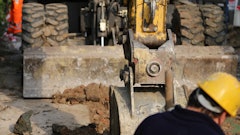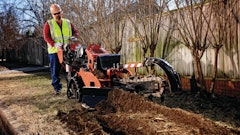
Recently, during the 2024 World of Concrete show, the American Concrete Pavement Association announced its new responsibility to help make roads and buildings more sustainable. The company includes many reports and studies that it has done on the topic.
According to the press release:
At the World of Concrete 2024, the American Concrete Pavement Association (ACPA) outlined its expanding role in helping various Departments of Transportation (DOTs), owners, and other decision-makers meet challenges such as rising inflation and new Federal funding structures. In 2024, the association will build on its 2023 white paper, "Concrete Pavement’s Role in a Sustainable, Resilient Future,” with the addition of tools and resources that help decision-makers meet global challenges while making dollars go further in a high-inflation market.
As an organization that offers market development and technical services not only to members and chapter/state affiliates but directly to agencies, ACPA’s focus in 2024 will be strategies that help owners and agencies meet funding criteria while achieving truly sustainable, resilient, and long-lasting infrastructure. One aspect of its support will be assistance in understanding how pavement materials decisions affect funding opportunities. Another pillar will be helping agencies move beyond first cost considerations to achieve long-lasting, sustainable pavements, again keeping in mind the objectives of Federal funding.
To kick off its year of enhanced consulting and education, the ACPA announced the following at World of Concrete:
- Release of a report titled, “How Agencies can Reduce Costs by Improving the Competitiveness of their Bid Environments.” The report details industry research, including research performed by the MIT Concrete Sustainability Hub (CSHub) that examines how the split of Department of Transportation (DOT) paving expenditures between industries impacts paving unit costs. Findings include the fact that, as inter-industry competition increases, unit costs of both concrete and asphalt paving materials fall significantly—particularly those of concrete. For example, if a state with a low concrete market share (e.g., 1%) were to increase its concrete market share to 25%, it would lower concrete and asphalt paving material unit costs by around 29% and 8%, respectively. The ACPA report also includes recommendations on how to start a competitive paving program.
- ACPA’s participation in the Reduced-Carbon Concrete Consortium (RC3). The RC3 will disseminate funding information, facilitate application submission, provide technical assistance, and enhance contractor preparedness with critical next steps like Environmental Product Declarations (EPDs).
- A growing library of long-life pavement case studies. The ACPA case studies can be accessed here.
The press conference also covered the International Grooving & Grinding Association’s white paper titled “Diamond Grinding: A Safe, Sustainable, Quiet and Cost-Effective Solution to Better Roadways.” The paper is an important contribution to the industry’s knowledge base because it highlights the gains to be made, both in terms of sustainability and cost savings, using proper pavement preservation and maintenance. It assembles research results, case studies and more demonstrating how agencies and engineers can achieve long-lasting, efficient, comfortable, and safe travel on highways—while also meeting the challenges of sustainability, noise levels, urban heat island effect, and budget—through the use of pavement diamond grinding. The IGGA is affiliated with the ACPA in a partnership known as the IGGA/ACPA Concrete Pavement Preservation Partnership (IGGA/ACPA CP3).
“Diamond grinding is the only highway surface treatment that is, in many situations, cost and carbon-negative,” said Nick Davis, the director of technical services at the International Grooving & Grinding Association.
“It’s no secret that states are struggling to meet infrastructure and sustainability needs—and inflation isn’t helping. However, the ACPA has identified many opportunities to help states address these challenges. The solution is not to race to the cheapest material to meet short-term needs. There are other viable solutions, which are sustainable, resilient, and long-lasting if they receive proper, eco-friendly maintenance and preservation,” said Laura O’Neill Kaumo, president and CEO of ACPA.
“In the pursuit of long-lasting, sustainable infrastructure, using the right paving material for a specific project is essential. At the ACPA, it is our mission to support DOTs and other agencies to make the best pavement choices, helping them succeed not only at the time of a pavement’s installation but maintaining that pavement into the future,” said Ernie Peterson, vice president of sales – midwest for Ash Grove Cement.
Building sustainable, resilient infrastructure is fundamental to creating a future that meets the needs of generations to come. ACPA’s tools and resources provide valuable guidance for road owners and other decision-makers as they weigh the many considerations involved in delivering this infrastructure.


























